ALL’S FAIR IN LOVE AND WAR: Movie Reviews of Their Finest and Frantz by Howard Casner
Posted: April 24, 2017 | Author: Donald | Filed under: Uncategorized | Tags: Bill Nighy, Eddie Marsan, Ernst Stotzner, François Ozon, Frantz, Gaby Chiappe, Gemma Atherton, Jack Huston, Jeremy Irons, Lissa Evans, Lone Scherfig, Marie Gruber, Paula Beer, Philippe Piazzo, Pierre Niney, Rachel Sterling, Richard E. Grant, Sam Claflin, Their Finest | 648 Comments »For questions: hcasner@aol.com
First, a word from our sponsors: I am now offering a new service: so much emphasis has been given lately to the importance of the opening of your screenplay, I now offer coverage for the first twenty pages at the cost of $20.00. For those who don’t want to have full coverage on their screenplay at this time, but want to know how well their script is working with the opening pages, this is perfect for you. I’ll help you not lose the reader on page one.
Ever wonder what a reader for a contest or agency thinks when he reads your screenplay? Check out my new e-book published on Amazon: Rantings and Ravings of a Screenplay Reader, including my series of essays, What I Learned Reading for Contests This Year, and my film review
s of 2013. Only $2.99. http://ow.ly/xN31r
and check out my Script Consultation Services: http://ow.ly/HPxKE
Warning: SPOILERS
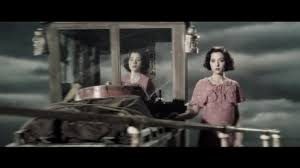 Their Finest is a movie about the making of a movie. But the creation of the film is done under rather extraordinary circumstances.
Their Finest is a movie about the making of a movie. But the creation of the film is done under rather extraordinary circumstances.
First, Hitler is raining bombs down on London during the blitz as the director is calling action.
Second, the film must be made to order and serve a certain propagandistic purpose.
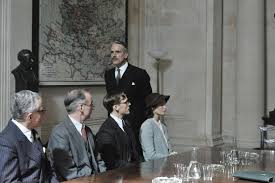 Their Finest, the title taken from a speech by Winston Churchill, opens at a British cinema with the audience watching a clunky and overly earnest film about working women giving their all to meet a war quota. Its intention inspirational, its result comedy unintentional.
Their Finest, the title taken from a speech by Winston Churchill, opens at a British cinema with the audience watching a clunky and overly earnest film about working women giving their all to meet a war quota. Its intention inspirational, its result comedy unintentional.
So the war ministry, headed with a marvelous cameo by Jeremy Irons as the minister, giving a rousing speech as if all involved are about to play rugby, wants a movie that is grounded in reality, but also has a message of hope (a seemingly contradictory request giving the dark days that have descended upon the empire).
Into this project steps one Catrin Cole (Gemma Atherton) who arrives thinking she’s applying for a secretarial position, but leaves as a screenwriter (well, someone has to write the women’s parts). She also leaves with a conflict: is her future to be a dutiful and supportive wife or an independent woman?
Since the movie is being made in 2017, the answer is fairly predictable.
Nevertheless, Their Finest is highly entertaining, never boring and ultimately moving. It’s a slickly made bit of stiff upper lip and the show must go on combined. I can’t see how anyone will be bored.
The most interesting aspect of the story, though, is not Catrin’s arc of mousy to independent, which is fairly standard, but how the movie manages to deal with the various slings and arrows thrown at the filmmakers and how they adapt and make due in trying to please all concerned, the funniest probably being a request from the Roosevelt administration that one of the central characters be an American (though Pearl Harbor has yet to happen). They select a flyer from the U.S. who has joined the RAF and who has become a popular hero. Unfortunately, though his credentials as a hero can hardly be challenged, no one bothered to find out whether his credentials as an actor were equally as good.
There are a couple of ironies here. The first is that the movie they make, The Nancy Starling, inspired by a story of two sisters, twins, who participated in D-Day, is only really surpassed by Their Finest due to technical superiority. In many ways, Their Finest, when all is said and done, may be aesthetically better than the movie within a movie the filmmakers make, but it’s little more than a movie grounded in realism that delivers a message of hope, something that the filmmakers in Their Finest tended to sneer at.
Second, though everyone cheers the idea that this breakout film is filled with working class heroes, the movie that really got everyone’s attention around the time in real life, Mrs. Miniver, is firmly focused on the upper class of the British caste system.
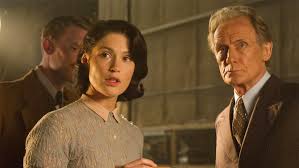 Still, as I said, the movie is highly enjoyable and it’s difficult to dislike anything that has Bill Nighy in it. And here he’s in top form as an aging actor who comes with a slice of ham, a prickly figure who has difficulty coming to terms with the idea that his days of being a matinee idol are over. He has a lovely moment at a gathering where he sings a sentimental song that can’t help but bring tears to the eyes.
Still, as I said, the movie is highly enjoyable and it’s difficult to dislike anything that has Bill Nighy in it. And here he’s in top form as an aging actor who comes with a slice of ham, a prickly figure who has difficulty coming to terms with the idea that his days of being a matinee idol are over. He has a lovely moment at a gathering where he sings a sentimental song that can’t help but bring tears to the eyes.
Also with Eddie Marsan as Nighy’s agent; Sam Claflin (Finnick Odair of The Hunger Games for those so inclined) as a fellow screenwriter and love interest; Jack Huston as Catrin’s cad of a boyfriend; Richard E. Grant as a producer; and Rachel Sterling (of The Detectorists) as a lesbian and assistant to the big bosses.
Gemma Atherton gives a strong performance as Catrin and she holds everything together rather well.
Directed by Lone Scherfig, who helmed the marvelous coming of age film, An Education, but has followed that up with solid, but uninspired fare like One Day. The screenplay is by Gaby Chiappe, one of Britain’s finer television writers, from the book Their Finest Hour and a Half, by Lissa Evans.
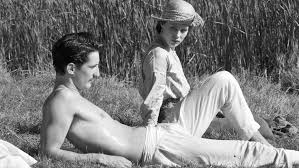 The title character in the new film Frantz is a young man who died in the trenches in World War One. His family is then visited by a Frenchman, Adrien, who claims to have been close friends with Frantz in Paris before the European conflict took place. The trio are at first reluctant to receive him, but as they get to know him, find solace in his memories.
The title character in the new film Frantz is a young man who died in the trenches in World War One. His family is then visited by a Frenchman, Adrien, who claims to have been close friends with Frantz in Paris before the European conflict took place. The trio are at first reluctant to receive him, but as they get to know him, find solace in his memories.
The direction is by Francois Ozon who wrote the screenplay with Philippe Piazzo. It’s inspired by an Ernst Lubitsch film, Broken Lullaby, which was in turn based on a play by Maurice Rostand, the son of Edmond Rostand, who wrote Cyrano de Bergerac.
But as it is in many Ozon films, nothing is quite what it seems and the story is driven by lies and deception, though often of the best intended kind.
Ozon may be a victim of the Hitchcock syndrome here. The master of suspense said he could never make Cinderella because everyone would expect there to be a dead body in the coach.
Ozon, in turn, has made many a film with gay central characters. So when Adrien claims to know Frantz, it seems as if he’s talking about in the Biblical way. It’s Ozon, what else could it mean?
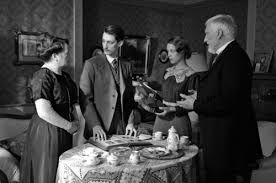 Well, something entirely different here and when the secret is revealed, it’s actually kind of a let down and a disappointment. The movie then takes some curious and not entirely uninteresting turns as it tries to decide if in life fantasy at times is more beneficial than truth. But it never really recovers from that central revelation.
Well, something entirely different here and when the secret is revealed, it’s actually kind of a let down and a disappointment. The movie then takes some curious and not entirely uninteresting turns as it tries to decide if in life fantasy at times is more beneficial than truth. But it never really recovers from that central revelation.
But I actually think there is a more serious problem and that is in the casting of Pierre Niney as Adrian. Actually, it’s not exactly the casting of the actor, but the casting of his mustache which, though popular at the time, is probably one of the more disastrous hirsute choices in film.
 For Niney, scrawny and large eyed as he is, the mustache makes him look like a young Salvador Dali, and is so distracting, it’s hard to take the character seriously. And then as time goes on, and Frantz’s fiancée Anna comes to look on him as a possible love interest, he has become something of a ninny such that rather than be unhappy when her love is not reciprocated, you feel as if she just dodged a bullet.
For Niney, scrawny and large eyed as he is, the mustache makes him look like a young Salvador Dali, and is so distracting, it’s hard to take the character seriously. And then as time goes on, and Frantz’s fiancée Anna comes to look on him as a possible love interest, he has become something of a ninny such that rather than be unhappy when her love is not reciprocated, you feel as if she just dodged a bullet.
With Paula Beer as Anna, Ernst Stotzner as Frantz’s father and Marie Gruber as his mother.
GROWING PAINS: Movie Reviews of Breathe and A Brilliant Young Mind by Howard Casner
Posted: September 30, 2015 | Author: Donald | Filed under: Uncategorized | Tags: A Brilliant Young Mind, Anne-Sophie Brasme, Asa Butterfield, Beautiful Young Minds, Breathe, Eddie Marsan, Inglourious Basterds, James Graham, Josephine Japy, Julien Lambroschini, Lou de Laage, Melanie Laurent, Morgan Matthews, Pierre Laurent, Rafe Spall, Sally Hawkins, The Simpsons | 2,025 Comments »First, a word from our sponsors: I am now offering a new service: so much emphasis has been given lately to the importance of the opening of your screenplay, I now offer coverage for the first twenty pages at the cost of $20.00. For those who don’t want to have full coverage on their screenplay at this time, but want to know how well their script is working with the opening pages, this is perfect for you. I’ll help you not lose the reader on page one.
Ever wonder what a reader for a contest or agency thinks when he reads your screenplay? Check out my new e-book published on Amazon: Rantings and Ravings of a Screenplay Reader, including my series of essays, What I Learned Reading for Contests This Year, and my film reviews of 2013. Only $2.99. http://ow.ly/xN31r
and check out my Script Consultation Services: http://ow.ly/HPxKE
Warning: SPOILERS
 Melanie Laurent is an artist probably best known in the U.S. for her role as the Jewish girl who escapes the clutches of Christoph Waltz in the opening of the film Inglourious Basterds. But she doesn’t seem to be somebody who is only going to do one thing. Not only does she sing, but she has also branched out into directing and screenwriting.
Melanie Laurent is an artist probably best known in the U.S. for her role as the Jewish girl who escapes the clutches of Christoph Waltz in the opening of the film Inglourious Basterds. But she doesn’t seem to be somebody who is only going to do one thing. Not only does she sing, but she has also branched out into directing and screenwriting.
Her most recent film, Breathe (her second feature), written by her and Julien Lambroschini from a novel by Anne-Sophie Brasme, is a very assured character study of Charlie, a high school teenager who suddenly finds her outer and inner world spiraling out of control.
The cause of this chaos is the arrival at her school of a transfer student, Sarah. At first Sarah seems sweet and good natured (in a rather clever little opening bit on her first appearance) and she quickly and very determinedly ingratiates herself into Charlie’s life.
But it’s not long before the audience sees what Charlie can’t. That Sarah has a darker aspect to her personality. In fact, it almost immediately becomes clear that Sarah is a sociopath. She quickly manipulates Charlie into dropping her present best friend without Charlie realizing she has done so. And it’s not long before the two new friends are inseparable. Read the rest of this entry »
Movie Reviews of THE WORLD’S END and DARK TOURIST by Howard Casner
Posted: September 1, 2013 | Author: Donald | Filed under: Uncategorized | Tags: Dark Tourist, Eddie Marsan, Edgar Wright, Frank John Hughes, Martin Freeman, Melanie Griffith, Michael Cudlitz, Nick Frost, Paddy Considine, Simon Pegg, Suri Krishnamma, The World’s End | 1,032 Comments »Simon Pegg and Edgar Wright have been very successful in the past in combining two genres and/or styles in one film. They began, of course, with the hysterically funny, zombie satire Shawn of the Dead (perhaps the only living dead film that has shown one whiff of originality since the early days of Dawn of the Dead and Return of the Living Dead). Hot Fuzz, their next venture, was a buddy cop film combined with that peculiar genre of the British cinema, the something is rotten in the state of a Miss Marple like quaint English village mystery/horror film.
The World’s End, as their new outing is called, is a combination of the old friends reuniting years later story with a sci-fi, Invasion of the Body Snatchers hook, line and sinker. The basic idea is that a slacker alcoholic (played by, who else, Simon Pegg) looks to relive his youth by talking his more successful friends into returning to the scene of their high school graduation so they can do what they didn’t do then, travel the Golden Mile—that is, go on the piss and have a pint at twelve different pubs, ending up at the conveniently and titularly named The World’s End; but they arrive at their home town in time to find that immigration reform is in full swing as the city will just let any alien in that wants to come.
I would like to say that three’s the charm here, but it looks like Pegg/Wright tried to light one two many cigarettes with the same match. I’m afraid to report that this time the dynamic duo never quite manages to bangers and mash these two genres together in any satisfactory way. In fact, it’s somewhat of a bollocks up operation all around (FYI, google search is great for finding British slang).
The screenplay is sloppy and never seems well thought out. The introduction of the sci-fi elements are clunky and out of nowhere at best (elegant is not a word that immediately leaps to mind in describing the structure here). The story never really makes a lot of sense (though I must say, everybody works their bum off—see FYI note above—to hide the fact, though they can’t quite do it). It felt like the reason for the invasion took a lot of constant explaining, over and over again, including a lengthy scene at the climax where the movie almost literally stops so it can all be explained yet again. And even after all that, though I sorta, kinda got it, I’m still not sure I did.
It all ends with one of those apocalyptic finales that is oh, so popular these days (I tell you, an apocalypse follows one writer home, and suddenly every writer on the block wants one of their own). But for me, this was so out of place with the rest of the movie, it just reinforced everything I had thought about the movie up ‘til then. In fact, it felt like one of those endings that was thrown together because no one really knew how to resolve the blasted, bloody (FYI, etc.) thing in the first place. In the end, the whole movie comes across as one of those great ideas that once agreed upon, no one quite knew what to do with it.
What it does have, though, is one of those spot on ensemble casts that outside of perhaps Woody Allen and the late Robert Altman, can only be found in British films (see Quartet, The Best Exotic Marigold Hotel and almost any Harry Potter film). It’s a talent we just don’t seem to have mastered locally since the days of the studio.
This illustrious list of thespians is headed by Mssr. Pegg, who gives a desperate and intense performance playing a desperate and intense character. Supporting him are Nick Frost, Martin Freeman, Paddy Considine and Eddie Marsan, one and all with remarkable chemistry and comic timing of the crack variety. They lob their often funny and/or witty lines at each other as if they were playing ping pong with a Monty Pythonesque rhythm. The give and take is so pitch perfect, it’s like being in a storm where the thunder comes almost immediately upon the flash of the lightning.
Unfortunate to say, I didn’t quite find that enough to compensate for the faults here and all in all, perhaps its best to say that The World’s End is just a bit of a cock up and let it go at that.
I went to see the new indie Dark Tourist (or as it’s sometimes called The Grief Tourist, which is a better name, though perhaps a bit too esoteric—though after watching the film, I did wonder why anyone would ever think doing something not esoteric could possibly help the movie commercially) at one of the local LCD (lowest common denominator) theaters; you know the kind, the one that shows blockbusters and other crowd pleasers. I’m not sure how Dark Tourist ended up here; whatever else you may think of it, the last thing you would accuse it of being is LCD.
No, Dark Tourist is about as indie as you can get. It revolves around Jim, a night watchman by night, what’s called a “grief tourist” by day, someone who travels from tragic location to tragic location, often the scenes of monstrous crimes, just to check it out. That’s not the only odd thing about Jim: he’s scared of germs; has more than a touch of OCD; and is a sociopathic liar. So far so good, and Michael Cudlitz (of TV’s Southland) does a nice, unsettling job of playing the title roll, at least for the first two thirds.
But a little more than halfway through, the film starts going a bit wibbly-wobbly. One problem is that the movie starts at such a high level of tension, mood and anxiety (it’s one of those indies in which everything looks overcast, filmed as if a storm is about to deluge itself at any moment) that when the director Suri Krishnamma and writer Frank John Hughes try to up the ante and throw in a shock or two, the movie suddenly becomes a little camp and over the top (accompanied by unintended tittering). It probably doesn’t help that the shocking twists are only shocking in that you can’t believe the writer and director would think they are shocking in 2013. And then as the writer tries to explain why Jim is the way he is, the less persuasive the movie becomes (the basic theory seems to be: gang raped as a young boy and you’ll grow up to become OCD and a serial killer of pre-op transsexuals—I can’t really prove the cause and effect wrong, I’m no psychiatrist, but it does feel a wee bit on the questionable side to me).
At the same time, it must be said that the movie does have is a first rate supporting cast with special to be taken of the sorely, sorely missed Melanie Griffith, an actress who has yet to receive her due, and who gives a touching and deeply moving performance as a kind hearted waitress that Jim treats very cruelly, as well as Suzanne Quest, in a strong performance playing one of the shocking twists.
Movie Review of STOKER and JACK THE GIANT KILLER by Howard Casner
Posted: March 5, 2013 | Author: Donald | Filed under: Uncategorized | Tags: Bryan Singer, Chan-wook Park, Eddie Marsan, Erin Cressida Wilson, Ewan McGregor, Ian McShane, Jack the Giant Slayer, Jacki Weaver, Mathew Goode, Mia Wasikowski, Nicholas Hoult, Nicole Kidman, Stanley Tucci, Stoker, Wentworth Miller | 7 Comments »When Michael Haneke, the acclaimed filmmaker of Amour and The White Ribbon, came to the U.S., he met with a producer who gave him a script to consider. It was an action film of some sort, a WWII something or other, a story totally inappropriate to Haneke for anyone who knew anything about his films. To paraphrase his reaction, he asked, Is this what Hollywood is? A place where they just grab any old thing they have lying around in a drawer to give you that hasn’t been produced yet?
This is what I thought while watching the movie Stoker. It’s directed by Chan-wook Park, the popular South Korean director of Oldboy and Thirst, and though I can’t say that’s how he got hired to direct this film, it certainly feels like some producer just had it lying around in his drawer and foisted it upon him.
The film was written by Wentworth Miller (his first foray into screenwriting, but I guess he had to do something to pass the time while behind bars) with Erin Cressida Wilson (Fur, Secretary) given credit as a contributing writer. In many ways, it’s basically one of those women in danger films that almost every actress made at one time or another in the 1940’s and ‘50’s, from Barbara Stanwyck to Joan Crawford to Katherine Hepburn (yes, even Hepburn made one). As in those films, a psychopath or sociopath or psychotic sociopath or sociopathic psychotic worms their way into a household; anything from camp to high tension occurs (and usually both). In this entry in the once popular subgenre, when the patriarch of a wealthy family dies, his brother suddenly shows up at his funeral and takes a rather creepy interest in his niece (the man is called Uncle Charlie for those who like film references and have seen Alfred Hitchcock’s Shadow of a Doubt). Various bad things happen as a result.
It’s not that there’s anything wrong with the screenplay. It certainly gets the job done. At the same time, for someone of Park’s oeuvre, it’s rather routine. No, I have to be honest here. It’s very routine. No, that doesn’t quite do it. It’s ridiculously and insultingly routine. Is this really the best the U.S. can offer a filmmaker of Park’s stature?
To Park’s credit, he directs the hell out of the movie. He fills it with odd angles and creepy sounds (there’s suppose to be some through line about the niece, India, being able to hear things other people can’t, though there never seemed to be a pay off for it). There’re all sorts of overlaps and dissolves and plenty of visual metaphors (like a spider crawling up India’s leg and going between her thighs—subtle much?). Park gives it the old Orson Welles try (who also had to constantly flaunt his directing in order to cover up lackluster material as in Touch of Evil and The Lady from Shanghai). And it must be said, Stoker is often an effective and even beautiful movie.
But it’s also one of these stories where people go missing and no one seems that concerned about what happened to them, unless it’s convenient for the plot. Everyone who knows Charlie’s secret seems extremely worried about India, but not her mother, Evelyn, who in many ways is chopped liver by the time the movie is over. The two both share the same house with Charlie, but it’s only India who anyone is concerned about (I thought sure the big revelation was going to be that Charlie was actually India’s real father, but no, this interest of Charlie’s for India was left a bit vague for me). And the ending doesn’t really resolve anything or provide a satisfying emotional resolution. In fact, by the time it was over, I was wondering whether a bit too much of it ended up on the cutting room floor.
The movie is nicely cast for the most part. The actors do the best they can with the material. Mia Wasikowski is India and she’s fine (she’s very good at sexual yearning and having an orgasm while playing the piano with her Uncle). Nicole Kidman handles the material well in her roll as an escapee from a Tennessee William’s play. The strongest acting comes from that remarkable down under discovery Jacki Weaver, and her performance here may make her one of the finest character actresses in films since Thelma Ritter. Mathew (A Single Man, Matchpoint, Watchmen) Goode is Uncle Charlie; he’s lovely to look at, but his performance is a bit flat, like his American accent.
I know I’ve been really hard on this film. But I think it’s because Park deserves better. The U.S. film industry has chewed up and spewed out many an artist over the years and I would hate to have the same thing happen to Park. But Stoker is not a promising beginning for an American career.
I saw Jack the Giant Slayer. Yes, I did. It was at this nice theater I love to go to and there really wasn’t much else showing and a friend wanted to go for lack of a better movie out there to see, so we went. It’s not a disaster. If only it were; it would have been a lot more fun. It’s actually, in certain ways, better written and acted and at times cleverer than Stoker. It’s directed by Bryan Singer (are we ever going to have another movie like The Usual Suspects again), has four authors (yes, four), and stars Nicholas Hoult, Ewan McGregor, Eddie Marsan and Ian McShane, with Stanley Tucci as the gay character who can’t be identified as gay because that would be offensive. But one spends most of the time wondering why any of them actually wanted to do the film. It’s one of those movies in which a woman claims to be raised by her mother to be a feminist, but the chief lesson she was taught is to marry for love. It’s one of those movies meant for a family audience, but it has so many people being slaughtered, that it’s just kind of depressing. It’s one of those movies where the good guys’ army is being massacred, but they never seem to run out of soldiers. In the end, it’s just one of those movies, one of the worst things a movie can be.












